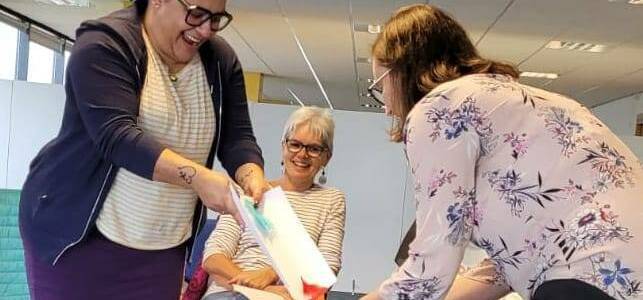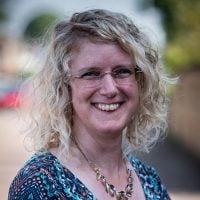Creative English for Health stories of impact: “I like it because it helps my life”

Creative English for Health has been delivered over the past year in Birmingham, funded by Birmingham City Council. We are looking forward to the imminent publication of the final evaluation report on the first year of delivery, which will show the progression against all 16 measures of the HLS-16 health literacy survey. We are also excited to be preparing for a second year of the programme in Birmingham by creating new material; this time explicitly targeted towards reducing the prevalence of cardiovascular disease and reducing the number of related emergency admissions. It’s exciting to see people empowered to better take care of their own health and that of their families.
Here are some stories which show some of the elements that make it work and their impacts:
Methodology gives confidence to resolve situations in English when needed
M would normally wait for her husband to come back from work and ask him to deal with any medical help needed for her family, as she did not consider her own English to be good enough to do it herself. Last week she phoned the GP and went to the emergency department with her son, dealing with a medical problem in her family independently for the first time. She said: “My son was vomiting, coughing, fever, three days so bad. I called my doctor and the doctor said take him to the emergency department. […] The doctor there gave him a spray and now he is OK. I was there for seven hours but because it was [a] weekday, [my] husband [was] working. I was OK talking to the nurses and the doctors and my son is feeling better. I am pleased I did the right thing. My son is OK now, still coughing little, but he is OK.”
Trusted community advocates as facilitators encourage people to act on health advice
After attending our sessions for screening checks, Miss U checked her breasts and managed to find a lump on her chest. At the moment she is undergoing treatment and she was really grateful that this issue was identified at an early stage as she had been ignoring her breast screening letter. “I am so glad that I have attended these sessions of Health Creative English and my teacher made me realise how important these screening tests are. Please carry on these sessions so they can aid other women like me “
Social benefits of the programme support positive lifestyle change
“Before I joined, I felt very isolated. I was a stay-at-home mom and did not have a social life or many friends. I was also overweight and have diabetes. The healthy workshop lesson has really helped me become more aware of healthy eating habits and the negative side effects of obesity which has helped me change my lifestyle. Meeting new people and making friends has also been very important for my wellbeing as I no longer feel isolated. Thank you for these health sessions. It has helped me change my lifestyle and bad habits”
Improved language skills resulting in better communication with health professionals
P became very emotional when she learnt the word ‘lungs’ in our session. P had been trying to communicate with her GP that she had a problem with her lungs for the last 4 years. Despite using an interpreter, she found that they still hadn’t conveyed her symptoms accurately to the doctor. It had been very distressing, as she had not been able to get appropriate treatment. After participating in the Creative English for Health programme, she returned to the doctor. Having explained the problem with her lungs and appropriate investigation, she has a diagnosis of long COVID. It has really helped her to finally know what has been causing her to feel so unwell.
Raising awareness of mental as well as physical health
L has a 15yr old daughter who has been struggling with her mental health. She didn’t know what to do to help her. As a result of the session on mental health, L feels she can talk to her daughter about seeking help and that she knows what to do. Prior to the session, she hadn’t actually realised you could speak to the doctor about mental health. A volunteer facilitator explained: ‘Lots of these learners don’t realise they can talk to their doctor about their mental health. They think they can only speak to them about physical health, or that the only kind of health is physical health, so that’s why we really want to support them to recognise when their mental health is suffering and to know what to do.’
Opportunities to explore different scenarios and avenues for treatment
R said she always used to panic when her son was ill. She would always go to A&E for help and did not know there were other sources of help and advice. Having completed Creative English for Health, she was able to respond differently. She said: “My child was sick and I [was] scared, but I look at photocopy [traffic lights for self-care, NHS 111 or A & E] and think no – is OK. Breathing is OK. Nappy OK. I monitor and stay home. Now he’s better. It helps to know what an emergency looks like. If he get[s] worse, I phone 111. I know I can ask for someone [to] help me. It’s hard as [a] parent to do [the] right thing, but this English [class] give me confidence.”
Combatting misinformation
N had suffered from poor mental health for a long period of time. She believed that anti-depressants are harmful and should not be taken. The volunteer facilitator was able to encourage her to go seek help from the doctor and to express her fears to the doctor. As a result, she started to take anti-depressants and has started counselling. N said: “I feel I can manage my mental health and I can now feel myself getting better, as the fear I had about medication has been clarified. Because of this I am now able to confidently help others like me who believe in rumours. I have joined the counselling sessions. From this, I am able to express myself and put things into perspective.”



